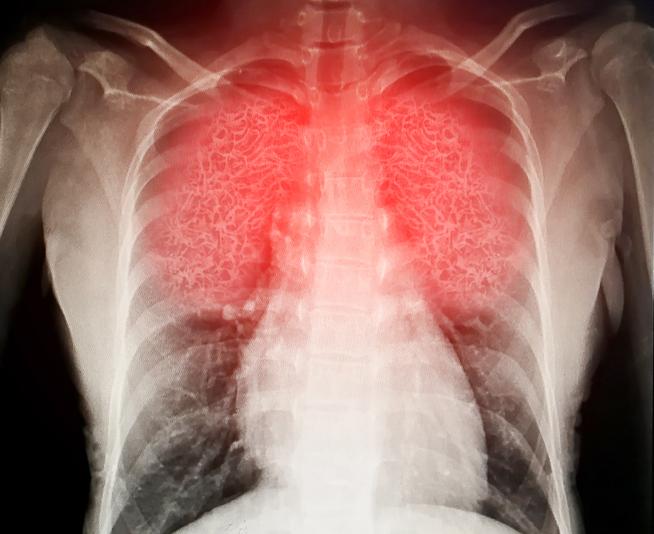
Qu'est-ce que la pneumonie ambulatoire ?
Peer reviewed by Dr Krishna Vakharia, MRCGPAuthored by Lydia SmithOriginally published 14 Feb 2023
- TéléchargerTélécharger
- Partager
Pneumonia, an inflammation of the tissue in the lungs, is a type of chest infection. Walking pneumonia is a non-medical term which describes a milder version of pneumonia, although in some cases, it can be serious.
Dans cet article :
Poursuivre la lecture ci-dessous
Qu'est-ce que la pneumonie ambulatoire ?
Pneumonia is the inflammation of the tissue in one or both lungs. Typically, it is caused by a viral or bacterial infection. This infection leads to the air sacs in your lungs being filled with fluid, which makes it harder for oxygen to reach your bloodstream.
Walking pneumonia is an informal term for a mild case of pneumonia1. However, it still is a lung infection.
The symptoms of typical pneumonia can cause a cough which may contain green, yellow or blood-tinged mucus, difficulty breathing, a rapid pulse, high temperature, flu-like symptoms such as sweating or shivering, chest pain and fatigue. Walking pneumonia symptoms are slightly vaguer.
Sélection de patients pour Infections thoraciques et pulmonaires

Poitrine et poumons
Quelle est la différence entre une double pneumonie et une pneumonie ?
Si la pneumonie peut mettre la vie en danger, une double pneumonie est-elle deux fois plus grave ? Il n'est pas nécessairement vrai que les chances de guérison sont moindres en cas de double pneumonie, mais il existe quelques différences notables.
par Amberley Davis

Poitrine et poumons
Pneumonie
La pneumonie est une inflammation (gonflement) du tissu pulmonaire. Elle est généralement causée par des infections bactériennes telles que Streptococcus pneumoniae. Cependant, elle peut également être causée par des infections virales, notamment la grippe et le coronavirus (COVID-19), ainsi que par des champignons. Cette infection provoque le remplissage des alvéoles pulmonaires (alvéoles) par du liquide, ce qui empêche l'oxygène d'atteindre la circulation sanguine. En conséquence, les patients peuvent avoir des difficultés à respirer.
par le Dr Mohammad Sharif Razai, MRCGP
What are the symptoms of walking pneumonia?
The symptoms of walking pneumonia include:
General tiredness - fatigue.
Sometimes, the symptoms can feel like a bad cold. However, in some cases of pneumonia, different types of atypical bacteria - bacteria that are different to the regular ones that cause pneumonia - can cause severe symptoms which may require hospital care.
Poursuivre la lecture ci-dessous
Is walking pneumonia contagious?
It is possible to catch pneumonia from an infected person. Contact with them, coughing or sneezing can transfer the virus or bacteria. Bacteria and viruses that cause pneumonia can also be transferred by touching a surface an infected person has come into contact with.
However, not everybody exposed to pneumonia-causing bacteria or viruses will develop pneumonia as their immune system may be able to fight it.
To prevent pneumonia from spreading it's important to cover your mouth when you cough and wash your hands regularly.
How is walking pneumonia treated?
Walking pneumonia doesn’t normally require treatment in hospital. The symptoms - a cough, high temperature and fatigue - can be treated with over-the-counter medications such as paracetamol and bed rest if it is caused by a virus. It’s also important to drink plenty of water to stay hydrated. Soft foods and lozenges may help to minimise irritation in the throat.
Poursuivre la lecture ci-dessous
How long does walking pneumonia last?
The symptoms of walking pneumonia usually go away within three to five days. However, if the symptoms remain or get worse, it’s important to visit your doctor.
Quand consulter un médecin
You should speak to your doctor if your cough lasts for weeks or there is weight loss but call an ambulance if you experience the following pneumonia symptoms:
Fast breathing.
Crache du sang.
Confusion or drowsiness.
You should go to hospital if you experience severe symptoms such as trouble breathing or a very high temperature.
If the pneumonia is caused by bacteria instead of a virus, it may need to be treated with antibiotics.
Pour en savoir plus
Historique de l'article
Les informations contenues dans cette page ont été évaluées par des cliniciens qualifiés.
14 Feb 2023 | Originally published
Auteur: :
Lydia SmithExaminé par des pairs
Dr Krishna Vakharia, MRCGP

Demandez, partagez, connectez-vous.
Parcourez les discussions, posez des questions et partagez vos expériences sur des centaines de sujets liés à la santé.

Vous ne vous sentez pas bien ?
Évaluez gratuitement vos symptômes en ligne